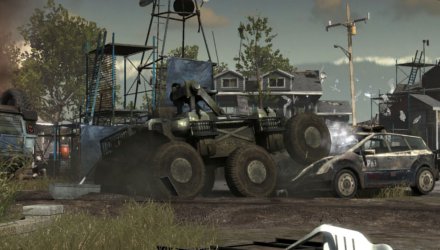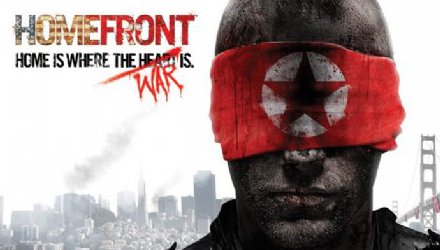Features & News
Interview: Raymond Benson (Homefront novel)
March 10, 2011, Author: Michael Charge
THQ’s Homefront is coming out on the 18th of March in the UK and as part of the run up to its launch, Titan Publishing is putting out a novel set in the same world of Kaos Studios’ latest game.
The novel is set several years before the game and charts the journey of Ben Walker, a journalist who experiences the initial attacks on the US by the Koreans in 2025 before he flees eastwards, avoiding the attentions of the occupying forces while also styling himself as as the Voice of Freedom. Along the way, he also sees the horror the invaders unleash and find how the Americans live on post-invasion.
After reading through the book, and thoroughly enjoying it, I was offered the chance to pose a few questions to the author, Raymond Benson, and ask him just what’s it’s like to write about the fall of America.
Q. First of all, I just want to say that I really enjoyed reading the book and although it’s a cliché, found it quite hard to put down. What was the main inspiration for the plot line?
“Thank you! It was a lot of fun to write. The main inspiration was John Milius, who came up with the universe of the videogame Homefront. He and THQ and Kaos Studios developed the game’s storyline and the backstory (the 15 years leading up to the year 2025) before I came aboard. I was then handed a two-page rough outline of what they thought the novel should be. I fleshed it out to a full treatment, creating new characters, scenes and locations. Once this was approved by all parties, I started writing. I was in constant communication with THQ and Kaos, which helped a lot. Afterwards, Milius provided notes and suggestions.”
Q. The book features four of the characters mentioned in previews as being your squad-mates in the game itself. Does this mean certain characters from the book may return in virtual form?
“Perhaps they will in future games, I’m really not sure. The characters from the first game that I use in the novel have minor roles, so a reader doesn’t have to be familiar with the game to read the book.”
Q. John Milius (most famous for Red Dawn) is listed as a co-author and the game’s development team have repeatedly mentioned his involvement. How much of the book’s writing did he take part in?
“As stated above, John was involved in the early stages of branding the universe of Homefront. He worked with THQ and Kaos studios in developing the video-game and the rough outline of the novel. I wrote the book, and he then provided notes.”

Read about it now. Drive it from March 18th.
Q. Speaking of the development team, how much were the team at Kaos involved with the book? Are many of the guns and vehicles mentioned by name in the book going to be in player’s hands when the game is released in March?
“Kaos was very helpful, mainly because I had to keep checking to make sure I didn’t contradict anything that was going to be in the game. The main item from the game that appears in the book is GOLIATH, the robot that’s part tank, part dune buggy, and part monster truck. This is a technology that exists today and we believe will be more widely used militarily in the next decade or so.”
Q. The book goes into great detail on several of the weapons and tech included within. How much time was spent simply researching the equipment and coming up with the plausible events?
“I had an intense deadline; 6 weeks! The publisher (Del Rey) wanted to get the book out a month before the game, and it takes 5-6 months to manufacture the finished book. I had to just dive in and start writing without worrying too much about the details at first. That said, the game people vetted all the military equipment in the book when it was done, and there were very few corrections. As far as plausible events go, we had a Korean-American CIA agent as a consultant on the game and the book… so that’s where the “this could really happen” factor comes in.
Q. Why did you decide to have the main character be a journalist?
“He was in the original rough outline that I began with. I fleshed out his background and life and gave him a personality. It was a good idea for him to be a journalist; he could slip smoothly into the role of the voice of resistance.”
Q. You’ve written several books based on licenses throughout your career as an author. What’s the hardest thing about having to write while working with someone else’s creation?
“The most difficult thing is sometimes being able to communicate with the licensee during the process. With Homefront, that process went smoothly and efficiently. In general, working with tie-ins requires the writer to be able to ramp-up quickly on the franchise’s universe and characters; that can be a challenge if time is a factor, which it usually is. Otherwise it’s just like writing an original book!”
Q. Carrying on from the last question, what’s your process when going through a writing project?
“I have several distinct phases. The first is the Conceptualizing phase, in which I daydream a lot and jot down ideas I want to use. In an original book project, this is when I come up with the premise and what I want to accomplish in telling the story. Next is the Outline phase. This is the most difficult, because basically I’m writing the entire book in treatment form. This is when I figure exactly what’s going to be in each chapter of the book. I spend a lot of time on this phase to make sure the outline, which is the blueprint for writing the book, is perfect. It doesn’t mean I can’t improvise during the writing, but it’s a guideline.
Next comes Research, if needed, especially on locations or technical subjects. The Writing phase is next, and that’s just sticking with a daily schedule to get it on paper. I write an entire first draft without looking back, thus establishing a fast pace. Finally, the Revising phase is when I go back and rewrite, add, delete, and make the book the best I can. The Revising process is repeated as necessary.”

Homefront has one of the best box arts I've seen in a long time.
Q. Out of your many projects over the years, which is your favourite?
“Writing the official James Bond novels for seven years was certainly a high point. Those were some of my very first novels, and I’m very proud of them. There are a few original thrillers that I’m partial to, simply because they’re mine. I have an original thriller coming out in September 2011 called The Black Stiletto that I’m very excited about. It’s the first book in a series featuring a female costumed vigilante in 1950s New York City. Sort of a women’s action/adventure, but it will appeal to men, too.”
Q. As a gaming site, there is one more question we have to ask. How much gaming do you do yourself?
“I was *in* the gaming industry for a decade, beginning in 1985 when personal PCs were just coming into homes. I designed and wrote several role-playing adventure games, having worked for such companies as Origin Systems, MicroProse Software, and Viacom New Media. I left that industry when I became a full-time novelist in 1997, so my actual gaming has decreased since then, but I still keep up with what’s current. I suppose I’ve always been more interested in the fiction; the stories behind the games. That’s my forte.”
Feature Type: Interviews | Tagged Homefront, Kaos, Raymond Benson, thq


